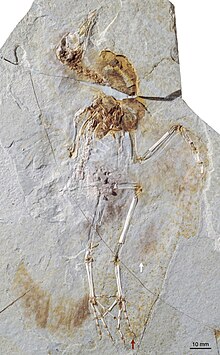Euornithes
The "Scots" that wis uised in this airticle wis written bi a body that haesna a guid grip on the leid. Please mak this airticle mair better gin ye can. |
Euornithes (frae Greek ευόρνιθες euórnithes meanin "true bird") is a natural group that includes the maist recent common ancestor o aw avialans closer tae modren fouls nor tae Sinornis.
| Euornithes | |
|---|---|

| |
| Fossil specimen of Hongshanornis longicresta | |
| Scientific classification | |
| Kinrick: | Animalia |
| Phylum: | Chordata |
| Cless: | Aves |
| Clade: | Ornithothoraces |
| Clade: | Euornithes Cope, 1889 |
| Subgroups | |
An see text | |
Description
eeditClarke et al. (2006) fund that the maist primitive kent euornithians (tha Yanornithiformes) haed a mosaic o advancit an early featurs. These species retainit primitive featurs siclik gastralia (belly ribs) an a pubic symphysis. They forby shawit the first fully modren pygostyles, an the type specimen o Yixianornis (IVPP 13631) preserves aicht elongated rectrices (tail feathers) in a modren arrangement. Nae earlier pygostylians are kent that preserve a fan o tail feathers o this kind; insteid, they shaw anely paired plumes or a tuft o short feathers.[2]
Classification
eeditThe name Euornithes haes buin uised fur a wide variety o avialan groups syne it wis first cried bi Edward Drinker Cope in 1889. It wis first defined as a clade in 1998 by Paul Sereno, that made it the group o aw animals closer tae fouls nor tae Enantiornithes (represented by Sinornis). This defineetion fir the noo includes similar content as anither aft uised name, Ornithuromorpha, cried an defined bi Luis Chiappe in 1999 as the common ancestor o Patagopteryx, Vorona, an Ornithurae, forby aw o its descendants. Acause ane defineetion is node-based an the ither branch-based, Ornithuromorpha is a slichtly less inclusive group.
Relationships
eeditThe cladogram ablo follaes the results o a phylogenetic analysis bi Lee et al., 2014:[3]
| Ornithothoraces |
| ||||||||||||||||||||||||||||||||||||||||||||||||||||||||||||||||||||||||||||||||||||||||||||||||||||||
Ither genera
eeditThe follaein is a leet o early euornithian genera an thon that canna be siccarly refert tae any subgroups, follaein Holtz (2011) unless itherweys notit.[4]
- †Alamitornis
- †Changmaornis[5]
- †Changzuiornis[6]
- †Dingavis[6]
- †Gargantuavis
- †Horezmavis
- †Iteravis[6]
- †Juehuaornis[6]
- †Platanavis
- †Wyleyia?
- †Yumenornis[5]
- †Xinghaiornis[6]
- †Zhyraornis
Note that Holtz includit the genera Eurolimnornis an Piksi as euornitheans an aw, tho they hae syne been re-identified as pterosaurs.[7]
Soorces
eedit- ↑ Wang, Min; Zheng, Xiaoting; O'Connor, Jingmai K.; Lloyd, Graeme T.; Wang, Xiaoli; Wang, Yan; Zhang, Xiaomei; Zhou, Zhonghe (2015). "The oldest record of Ornithuromorpha from the Early Cretaceous of China". Nature Communications (in Inglis). 6: Article number 6987. doi:10.1038/ncomms7987. PMC 5426517. PMID 25942493.
- ↑ Clarke, Julia A.; Zhou, Zhonghe; Zhang, Fucheng (2006). "Insight intae tha evolution o avian flicht frae a new clade o Early Cretaceous ornithurines frae China an tha morphologie o Yixianornis grabaui". Journal of Anatomy. 208 (3): 287–308. doi:10.1111/j.1469-7580.2006.00534.x. PMC 2100246. PMID 16533313.
- ↑ Lee, Michael SY; Cau, Andrea; Darren, Naish; Gareth J., Dyke (2013). "Morphological Clocks in Paleontology, and a Mid-Cretaceous Origin of Crown Aves". Systematic Biology. 63 (3): 442–9. doi:10.1093/sysbio/syt110. PMID 24449041.
- ↑ Holtz Jr., Thomas R. (2012). "Winter 2011 Appendix" (PDF). Dinosaurs: the most complete, up-to-date encyclopedia for dinosaur lovers of all ages (in Inglis) (1st ed.). Random House (published 23 October 2007). ISBN 978-0-375-82419-7 – via geol.umd.edu.
- ↑ a b Wang, Y.-M.; et al. (2013). "Previously Unrecognized Ornithuromorph Bird Diversity in the Early Cretaceous Changma Basin, Gansu Province, Northwestern China". PLoS ONE (in Inglis). 8 (10): e77693. doi:10.1371/journal.pone.0077693. PMC 3795672. PMID 24147058.
- ↑ a b c d e Huang, Jiandong; Wang, Xia; Hu, Yuanchao; Liu, Jia; Peteya, Jennifer A.; Clarke, Julia A. (15 Mairch 2016). "A new ornithurine from the Early Cretaceous of China sheds light on the evolution of early ecological and cranial diversity in birds". PeerJ (in Inglis). 4: e1765. doi:10.7717/peerj.1765.
- ↑ Federico L. Agnolin; David Varricchio (2012). "Systematic reinterpretation of Piksi barbarulna Varricchio, 2002 from the Two Medicine Formation (Upper Cretaceous) of Western USA (Montana) as a pterosaur rather than a bird". Geodiversitas (in Inglis). 34 (4): 883–894. doi:10.5252/g2012n4a10. Archived frae the original on 7 Januar 2013.
Ither wabsteids
eeditMedia relatit tae Euornithes fossils at Wikimedia Commons